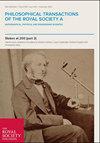空间机械臂系统的接触动力学与力控制
Philosophical Transactions of the Royal Society of London. Series A, Mathematical and Physical Sciences
Pub Date : 2001-11-15
DOI:10.1098/rsta.2001.0886
引用次数: 3
摘要
研究了柔性空间机械臂系统与有效载荷接触动力学的详细建模问题。直接接触的部件(机械手的末端执行器和有效载荷)使用有限元方法建模,而系统的其余部分通过通常的柔性多体公式处理。然后,系统动力学由一组微分方程组成,这些微分方程受到表示运动或接触约束的代数方程的约束。然后使用该动态模型设计复合控制器,该控制器必须同时实现三个目标:(i)轨迹跟踪,(ii)力控制和(iii)多体系统柔性自由度的稳定。采用奇异摄动法得到了两个降阶模型;随后,采用慢子系统设计了基于阻抗控制的位置/力混合控制器,采用快子系统设计了线性二次型调节器(LQR)。本文章由计算机程序翻译,如有差异,请以英文原文为准。
Contact dynamics and force control of space manipulator systems
Detailed modelling of contact dynamics involving a flexible space manipulator system and a payload is considered in this paper. The components undergoing direct contact (the end–effector of a manipulator and a payload) are modelled using the finite–element method, while the rest of the system is handled through the usual flexible multi–body formulation. Then, the system dynamics is composed of a set of differential equations subjected to sets of algebraic equations expressing kinematic or contact constraints. This dynamic model is then used to design a composite controller which must simultaneously achieve three goals: (i) trajectory tracking, (ii) force control and (iii) stabilization of the flexible degrees of freedom of the multi–body system. The singular perturbation method is used to obtain two reduced–order models; subsequently, the slow subsystem is used to design a hybrid position/force controller based on impedance control, and the fast subsystem is used to design a linear quadratic regulator (LQR).
求助全文
通过发布文献求助,成功后即可免费获取论文全文。
去求助
来源期刊
自引率
0.00%
发文量
0

 求助内容:
求助内容: 应助结果提醒方式:
应助结果提醒方式:


